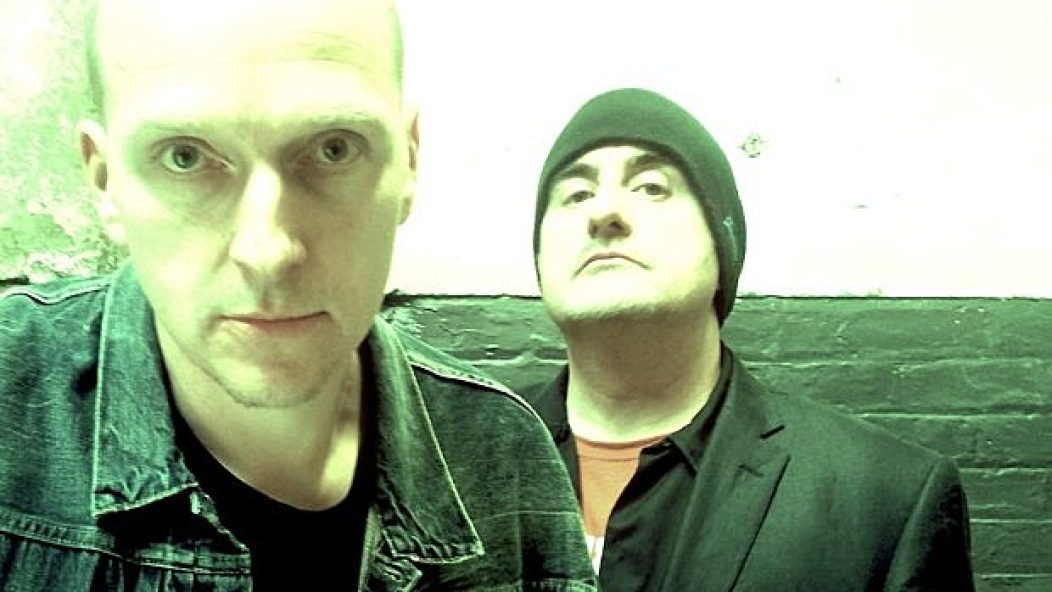
“It's a relationship like one would have with a sledgehammer: very singular”—The return of Godflesh
When Justin Broadrick and Christian “Benny” Green—aka GODFLESH—appeared on the planet’s underground metal and noise-rock scenes back in 1988, nobody realized how influential they would become. But by the time they ended up on the cover of AP 48 in June 1992, the duo were passionately embraced by discerning metalheads, noise-rock aficionados and industrial dance-rock cabals. Godflesh’s sound was all about maximum sonic punishment at lumbering tempos, searing harmonics and heart-crushing low end, topped off with Broadrick’s seething lyrical invective. (The line “Don’t hold me back/this is my own hell” on “Christbait Rising” from the band’s 1989 masterpiece, Streetcleaner, feels like it was written last week.) When Green chose to leave in 2001, Broadrick carried on with a lineup featuring the late bassist Paul Raven (Killing Joke, Ministry) and drummer Ted Parsons, but pulled the plug on the band and retired the name, choosing to focus on his melodic ambient unit Jesu.
 Last year, Broadrick and Green committed to adding new levels to Godflesh’s sonic hate tower. Earlier this summer, the duo issued Decline And Fall, a six-song EP whose tracks range from their patented dirge-metal conventions to shatter ’n’ paste deconstructions aided by today’s recording technology. But it still doesn’t prepare you for A World Lit Only By Fire, the band’s first full-length in 12 years, issued on Broadrick’s label Avalanche. Being able to “rock” is one thing: Tearing down listeners’ complacency while sticking to your artistic vision and not a delineated “market share” is another assassin’s trade altogether.
Last year, Broadrick and Green committed to adding new levels to Godflesh’s sonic hate tower. Earlier this summer, the duo issued Decline And Fall, a six-song EP whose tracks range from their patented dirge-metal conventions to shatter ’n’ paste deconstructions aided by today’s recording technology. But it still doesn’t prepare you for A World Lit Only By Fire, the band’s first full-length in 12 years, issued on Broadrick’s label Avalanche. Being able to “rock” is one thing: Tearing down listeners’ complacency while sticking to your artistic vision and not a delineated “market share” is another assassin’s trade altogether.
Jason Pettigrew chatted with Broadrick just after he completed “six interviews with six Australian journalists asking the same six questions.” Despite the rancor and seething he holds as a card-carrying misanthrope, he’s still joyously positive, and promises he will never poison his son with his nihilism—until his youngin’ is old enough to understand.
Congratulations on building a cottage industry on bile. Now that you are running your own label, it has to be better than the days when Godflesh were in service to labels.
JUSTIN BROADRICK: Oh my God, it’s been such a long time coming. It’s a bit of a paradox: The industry is not the same as it was so it does give us the luxury of running our own label. We all know sales aren’t what they used to be, [running a label] is a lot more manageable now. Back in the ’90s, I would’ve had to hire a staff to do things. Even today, I’ve had people ask me, “So how many people do you have working at your label?” And I’m like, “Me.” [Laughs.] It’s manageable now, because we’re not living in the same kind of [music industry] climate there was back then. I have a good support system, a manufacturer and a distributor to get all the problems out of my hair—what little hair I’ve got left. Not that I’m going bald, Jason. [Laughs.]
You have a lot of outlets for other kinds of work, like Jesu and the solo work under the names JK Flesh, Final and Pale Sketcher. After reactivating Godflesh, have you had to reschedule your art life significantly?
The next solo material will be coming out on Avalanche Recordings. I think it’s more identifiable as the darker side of things. But yeah, I’m bouncing around a whole lot of stuff; Godflesh and Jesu are kind of tough to balance because they are the most popular projects, so I’m just concentrating on Godflesh for the next year.
Hindsight is always 20/20. Where do you think Godflesh sit in the canon of today’s heavy music? Have you had that moment where you are listening to a band and you wonder, “Hmmm, I wonder how many Streetcleaner shirts they own…”
For me, splitting up was one of the best things Benny and I ever did, Because it seems to have afforded us the classic “legendary” status. We know for a fact that if we continued existing all through those years, we’d barely get any attention now. We get described in horrible terms like “the godfathers of industrial metal” and other disgusting things like that. Shitty monikers aside, I feel like I’ve been really lucky. People think that we were light years ahead of our time—which I had a bit of an ego about back then, but not any more—but we’re absolutely grateful that we’ve managed to get that much attention and be revered. We’ve seemed to be heralded as “innovators” and still doing something relevant. It’s quite amazing, really.
I listen to our music and then I listen to others’ [work] and I feel that somehow, respective of this alleged wide range of influence that we’ve had across heavy music, there’s still very little out there that sounds like us. I haven’t really heard anything recent that sounds that similar to us. So I still feel that we have a very unique voice. I still don’t see where we fit in. Generally speaking, we just make heavy music—so does Jesu to some extent—but yeah, it is very strange.
What is the relationship between the Decline And Fall EP and A World Lit Only By Fire? Were they recorded at the same time?
Basically. I began writing stuff at the end of 2012 and well into 2013 and we started recording around September 2013. It was a good year of writing, very intermittently; it was a cycle of writing stuff, discarding things and coming back to it again and eventually putting together a whole ton of stuff. There were 10 songs that made sense to create a full, fluid album. I was really conscious about making an album: On some of the previous Godflesh albums, I would ram loads of songs on a CD simply because I could. I was really into making a record you could digest in one [listen]. Some of the tracks on Decline we did by taking existing recordings and cutting them up on the computer and reassembling them, similar to what we did on the Merciless EP. I figured that, in classic Godflesh tradition, we should release an EP first, followed by the album a few months later. I feel like the EP is a little more dynamic than the album. And we intentionally wanted to release this record that would somewhat lead people down the wrong road, for want of a much better expression. The album to me is simplistic, non-progressive and very brutal. It has a relationship like one would have with a sledgehammer: very singular.
Tracks like “Carrion” and “Life Giver Life Taker” seem deliberately more structured, as opposed to the “maximum minimalism” that has been Godflesh’s stock in trade. “Obeyed” ends abruptly, like you were tired of playing the riff. Were there any disagreements between you and Benny making new music? Was there talk like, “Oh, that’s too light” or “That sounds too much like Streetcleaner” or other criticisms you both felt strongly about?
We had very little disagreements about anything, really. Benny was immediately in agreement that he felt this stuff was generally very direct. What he really enjoyed was where the production was going. Before he had even laid down the bass lines, I had already started building the tracks and he felt it was a very honest representation of where Godflesh should be now. I’m looking at the song list right now and I’m trying to think if we had any basic disagreements. I think we had problems during the mixes, that thing where you start off doing 15 fucking mixes of each song and you come full circle to realize the best ones were the first two. [Laughs.] So we went through a period of expressing the same fucking thing, really. It may sound like a regressive statement, but we went back to our early records as a blueprint because we felt like it was an honest representation of what Godflesh were attempting to achieve.
What do you think constitutes going over the top in regards to making dense, heavy music? That feeling where during the pursuit of creating something extreme, it ends up being cliché.
Everything is so fragmented now that I think in terms of modern context, it seems that contemporary heavy music is derived an awful lot from the black-metal scene. I think extreme music has been informed by black metal in the last 10 years. But that’s how it is: Someone creates something, it’s used as a blueprint and then everything starts to sound the same for the next two to three years. It’s kind of funny: I still do search out extreme music myself. I hear very little performed on guitars, it’s usually noise-based or with power electronics—the things I liked as a kid, really. I guess I have a different bottom line than some people, because I rarely listen to music for extremity’s sake. I still listen to a wide variety of music than I ever did, but extreme music is just a very small percentage of my daily listening.
I was going to ask you if running a record label, doing administration for the band and being a parent got in the way of you seeking new things out.
I don’t know if it’s an age thing, but more often than not, a lot of the music that I’m discovering now is mostly in the ambient area. I don’t know why that is, but that seems to be about 50 percent of my listening habits is more somber, late-night listening. But that may have to do with my lifestyle and my environment. When my working day ends, I’m spending time with my son and partner. So it has to do with my lifestyle, I guess. But I’m constantly hearing music in that context.
I have a friend of mine who has a son who just started high school. My friend grew up listening to classic Black Sabbath sides, American noise-rock, Godflesh and is now into the more black-metal work of bands like Anaal Nathrakh and Deathspell Omega. The sentiment of Godflesh has always been oppressive, bleak and dark. Now my friend doesn’t want to instill to his son that life is bleak…
[Broadrick roars with laughter.]
…but you have a three-year-old son. How do you reconcile your art with your daily living? I think raising a child in this scary world is probably the bravest thing a person can do these days. How does raising a child impact both your aesthetic life and your own psychic travails?
Hugely. We could probably talk about this for the next 10 hours. First, things are really divided, because he’s at an age of discovery. He started his first school this week. It’s been quite odd taking him to school: I was the only male there, as my partner was ill and she couldn’t take him. Then I get back home, and I have to do interviews where I’m talking about bleak, nihilistic music, having just been at preschool where it’s highly positive and I was commandeering four or five children, including him. He’s brought so much to my life; it’s brought me balance. But there’s a great sadness involved, as you can imagine. For me, life ain’t great. It’s a struggle, minute to minute, hour to hour, day to day. And the outside world is a fucking horror story. Since moving from Birmingham, I’ve isolated myself more and more. We live in a rural village in North Wales with a tiny population. When you have to go shopping, you have to confront the dregs of humanity. [Laughs.] But by and large, we don’t have to.
I’ve had people say to me, “As someone who peddles some of the bleakest music out there, what the fuck are you doing bringing a child into the world?” It’s a very pertinent question. When we initially found out my partner was pregnant, we weren’t sure what to do. But something biologically in both of us told us that [raising a child] was right. And I couldn’t have made a more positive decision in my life. Being a parent is the most beautiful thing I’ve ever experienced. But it doesn’t make my hatred and frustration of humanity—and myself—any less. It probably somehow reinforces it. I reconcile it as “Life is this, and one day, he will experience it, too.” But for now, he’s removed from my philosophies.
I know a lot of people who make extreme music and have kids. Some of my good friends are Scott Kelly and Steve Von Till of Neurosis. Steve’s kids are somewhat younger, but I know Scott’s son really well, and he makes extreme music. In fact, the last time Godflesh were in America, he stage-managed two of our shows—which were awesome. So I’m essentially seeing the path my son is going to go down. [Laughs.] But for now, we’re happy to sit down, read “Little Red Riding Hood” and have life be as cute and beautiful as it can be for a child. alt







